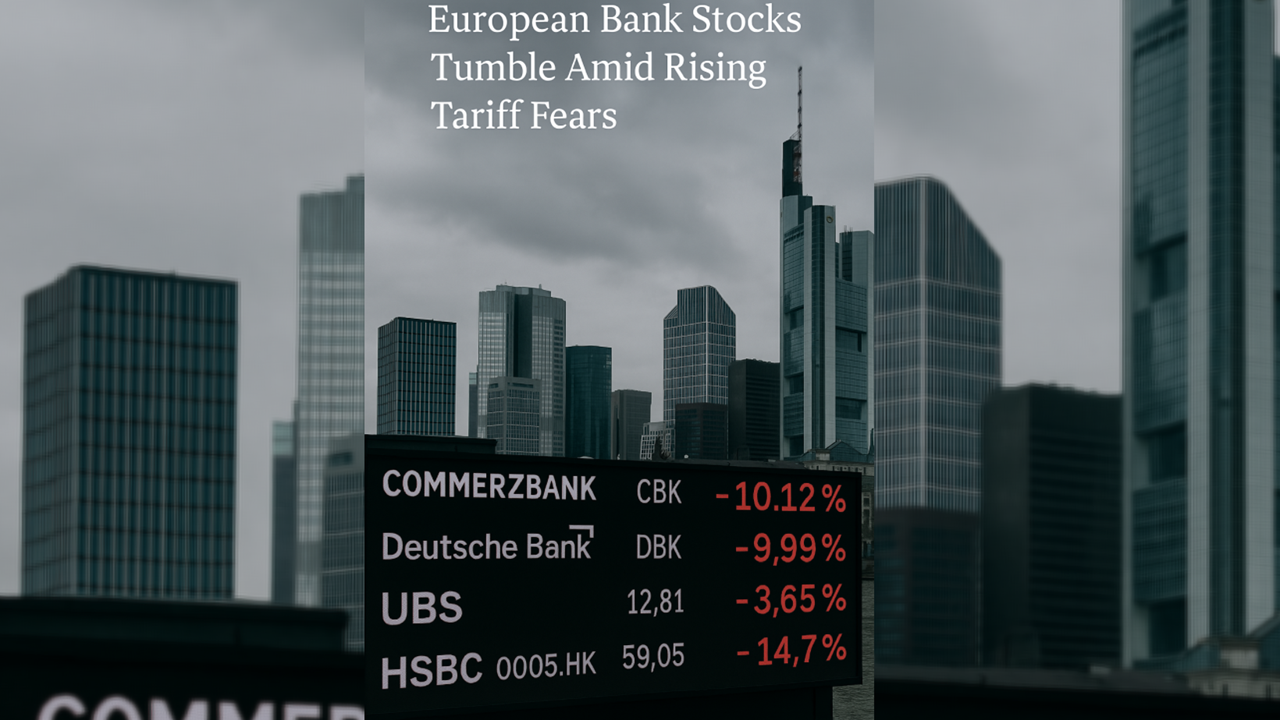European Bank Stocks Tumble Amid Rising Tariff Fears
European banking stocks continued to slide as escalating U.S. tariffs fueled global recession concerns. Major institutions like Commerzbank and Deutsche Bank led the sell-off, with international counterparts including UBS and HSBC also taking significant hits.

Shares in major European banks plummeted for a third straight day as investors braced for the economic fallout of rising U.S. tariffs, deepening fears of a full-blown global trade war and looming recession. The sharp sell-off, centered on heavyweight German and Swiss lenders, signals broader concerns about the stability of the European financial sector in a time of mounting geopolitical tension.
Commerzbank and Deutsche Bank—two of Germany’s most prominent financial institutions—each saw their share prices fall between 9.5% and 10.3% during early Monday trading in Frankfurt. This follows steep declines on Friday, when Commerzbank closed 5.4% lower and Deutsche Bank shed nearly 10%. The downturn reflects investor jitters over both banks’ exposure to international markets and their vulnerability to prolonged trade disruptions.
The ripple effects weren’t confined to Germany. Switzerland's UBS saw its shares dip 3.6% in pre-market trading, while Japanese banking stocks were also hammered, with the Nikkei banking index dropping as much as 17%. HSBC, a bellwether for global finance with significant exposure in Asia, faced one of the steepest declines, with its Hong Kong-listed shares plunging nearly 15%.
At the heart of the market anxiety is a renewed wave of tariffs announced by U.S. President Donald Trump, targeting a broad range of imports from Europe and Asia. The tariffs, which come amid stalled diplomatic negotiations and increasing rhetoric over trade imbalances, have intensified fears that retaliatory measures could choke cross-border commerce and sink fragile economic recoveries worldwide.
Economists warn that European banks are particularly exposed. Many rely heavily on global lending, investment banking, and international trade flows—activities that are often among the first to falter during periods of heightened protectionism and slower economic growth. The prospect of a sustained tariff battle raises the specter of credit defaults, lower loan demand, and weakening revenue streams.
"This is not just a blip," said a Frankfurt-based investment strategist who requested anonymity due to client sensitivity. "The fear now is that we’re entering a systemic downturn driven not by market fundamentals but by policy-driven shocks. Banks are always the first to feel that tremor."
The losses come at a precarious time for European financial institutions, many of which have struggled in recent years with low interest rates, tightening regulatory demands, and structural inefficiencies. Deutsche Bank, for instance, has been in the midst of a protracted restructuring plan aimed at cutting costs and refocusing its business after years of underperformance and scandals.
Meanwhile, investors appear to be fleeing banking stocks in favor of safer assets like government bonds and gold, both of which have seen sharp inflows since the latest tariff announcements. That shift underscores a broader sense of caution that could define market sentiment in the weeks ahead.
Although it remains unclear whether the current tariffs will lead to prolonged trade hostilities or eventually give way to renegotiated agreements, the immediate impact on banking stocks is unmistakable. With confidence shaken and valuations sliding, European banks now face the twin challenges of market volatility and political unpredictability—both of which could determine the sector’s trajectory through the remainder of 2025.










